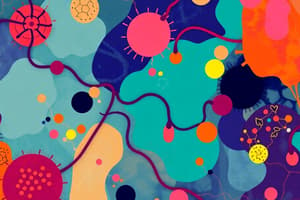Podcast
Questions and Answers
What factor is NOT considered to contribute to a drug's abuse potential?
What factor is NOT considered to contribute to a drug's abuse potential?
- Time of day the drug is taken (correct)
- Pharmacology
- Route of administration
- Psychological and sociocultural context
Which route of administration is often associated with a higher potential for abuse?
Which route of administration is often associated with a higher potential for abuse?
- Injection (correct)
- Inhalation
- Oral ingestion
- Sublingual absorption
Which statement about the War on Drugs is accurate?
Which statement about the War on Drugs is accurate?
- It had no impact on racial disparities in incarceration.
- It significantly reduced the number of drug-related incarcerations.
- It disproportionately affected women and Asian Americans.
- It increased the prison population largely for drug offenses. (correct)
What major issue does the 1875 Opium Ban highlight regarding drug legislation?
What major issue does the 1875 Opium Ban highlight regarding drug legislation?
What is a common consequence of chronic drug use?
What is a common consequence of chronic drug use?
Which of the following drugs is exemplified by its ability to quickly cross the blood-brain barrier?
Which of the following drugs is exemplified by its ability to quickly cross the blood-brain barrier?
How does psychological dependence affect an individual?
How does psychological dependence affect an individual?
What was one of the primary reasons for the initial ban on opium in the U.S.?
What was one of the primary reasons for the initial ban on opium in the U.S.?
What is the primary focus of psychopharmacology?
What is the primary focus of psychopharmacology?
Which of the following describes a psychoactive drug?
Which of the following describes a psychoactive drug?
What does the term 'ethnopharmacology' encompass?
What does the term 'ethnopharmacology' encompass?
What does the term 'Pharmako' translate to from ancient Greek?
What does the term 'Pharmako' translate to from ancient Greek?
What role have 'Plant People' historically played in society?
What role have 'Plant People' historically played in society?
Which of the following best defines drug abuse?
Which of the following best defines drug abuse?
What is a significant cause of addiction as discussed in psychopharmacology?
What is a significant cause of addiction as discussed in psychopharmacology?
What historical figure is associated with significant knowledge of medicinal plants?
What historical figure is associated with significant knowledge of medicinal plants?
Flashcards are hidden until you start studying
Study Notes
Overview of Psychopharmacology
- Psychopharmacology studies the impact of drugs on biological systems and behavior.
- Routes of administration include oral intake and intravenous delivery.
- Target sites for drug action are primarily located in the brain.
- Drugs undergo metabolism and excretion for elimination from the body.
- Addiction arises from changes in brain function stemming from repeated drug use.
Key Historical and Cultural Aspects
- Early medicinal practices involved the use of plants in rituals and ceremonies.
- Mystical experiences often influenced the use of drugs to induce altered states of consciousness.
- Societal values have guided the evolution of drug laws, addressing addiction concerns.
Origin of the Term "Pharmaco"
- The term "pharmako" comes from ancient Greek, meaning "medicine/poison."
- The Greeks recognized that the distinction between medicine and poison lies primarily in dosage.
Definitions
- A drug is an external chemical that alters physiological functions in small amounts.
- Psychoactive drugs affect mental processes like thoughts and feelings, often sourced from plants.
- Aspirin, derived from willow bark, serves as a prominent example of a widely used drug.
Key Terminology
- "Psyche" signifies the mind or soul in Greek.
- "Droog" in Dutch refers to dried plants, which is the origin of the term "drug."
Ethnopharmacology
- Ethnopharmacology explores the connection between humans and plant-based drugs, often learned through trial and error.
- Plant-derived drugs have historically been utilized in spiritual practices for consciousness alteration.
- Cannabis was domesticated for medicinal and recreational purposes prior to major crops like corn.
Historical Figures and Practices
- "Plant People," including healers and shamans, have historically used plants for healing.
- Hildegard von Bingen, a German nun, documented medicinal plants and suffered from migraines, interpreting them as visions.
Drug Abuse and Addiction
- Drug abuse refers to a detrimental relationship with drugs that can lead to addiction and overdose.
- Abusive patterns can emerge from the pharmacology, administration route, dosage, and contextual factors.
Factors Contributing to Abuse
- Key pharmacological properties include a drug's ability to penetrate the blood-brain barrier quickly.
- Dosage and route of administration significantly affect a drug's potential for abuse.
- Psychological stress and sociocultural norms can influence drug use behaviors.
Drug Offenses and Incarceration
- A significant percentage of federal offenses pertain to drug-related activities, often involving addicts rather than dealers.
- The War on Drugs (1980-2019) escalated incarceration rates, disproportionately impacting men and people of color.
- Racial disparities exist, with 1 in 3 Black men facing potential incarceration linked to drug-related offenses.
Drug Laws
- The first U.S. drug ban was the 1875 Opium Ban, targeting the opium poppy's sap, which contains opioids.
- Opium's historical use in China for recreational purposes led to widespread addiction and subsequent concerns in the U.S.
- The 1875 opium smoking ban specifically targeted Chinese immigrants while Euro-Americans continued liquid opium usage without restrictions.
Additional Key Concepts
- Addiction represents a compulsive need for a substance, influenced by brain reward system changes.
- Chronic drug use can lead to physical dependence, withdrawal symptoms, and psychological dependence for daily functioning.
- The blood-brain barrier limits substance passage into the brain, affecting drug effectiveness and abuse risk.
Studying That Suits You
Use AI to generate personalized quizzes and flashcards to suit your learning preferences.




